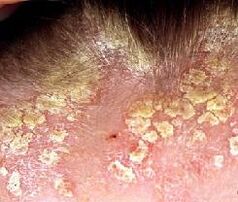
One of the most common forms of the disease is scalp psoriasis.
The disease itself is not an infectious process, however, the disease progresses by an inflammatory nature.
The symptoms of psoriasis are very typical for fungal diseases - spots that are red or pink on the head, have a different shape.
In addition to the formation of single or multiple rashes, the skin also appears itchy, burning and inflamed.
Causes of Psoriasis
Why does psoriasis on the head happen, and what is it? Doctors still don't know why some people develop scalp psoriasis. Doctors periodically come up with new theories and refute old ones. The causes of the development of the disease are often associated with genetic predisposition, and the factors that cause their occurrence include:
- Genetic burden - it has been shown that in parents with psoriasis, the likelihood of their children developing the disease is higher.
- Violation of the formation and maturation of epidermal cells, according to one of the hypotheses, is the main reason for the development of the disease.
- It is also hypothesized that the cause is not in the epidermis, but because the body's immunity produces the wrong factors that adversely affect the skin.
- According to some scientists, disorders of the endocrine system also contribute to the development of the disease.
The most likely cause for the development of psoriasis is now considered an autoimmune process in the patient's body.
Is your hair falling out?
Patients are often interested in the question - can psoriasis cause hair loss? It should be noted that mass baldness does not occur. If such a process occurs, then in insignificant quantities, since the hair follicles are located deep and the disease does not affect them.
Is psoriasis contagious?
This fear is related to the unusual appearance of psoriasis and its history. In ancient times, psoriasis was mistakenly considered a form of the dreaded disease of leprosy. From the above reasons for the occurrence of psoriasis, it is clear that this disease cannot be of the type that is contagious. Therefore, the answer to the question of whether psoriasis is contagious is one - no.
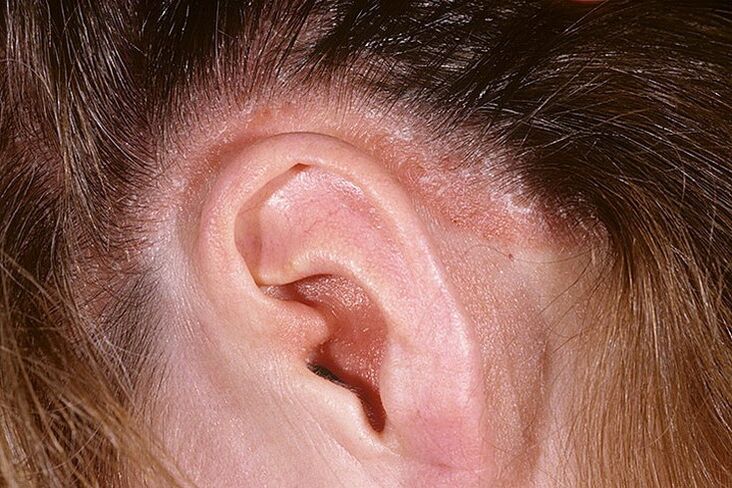
Symptom
Scalp psoriasis is accompanied by the appearance of a characteristic rash on the skin, which manifests as spots or, more often, patches of light pink to red-brown color. In most cases, the elements of the rash are penetrated from a minimally palpable elevation above the level of healthy skin to a more pronounced infiltration of more than 1 mm.
In the early stages, it is only diffuse, without inflammatory manifestations and clearly demarcated, can flake off in the form of dandruff. It is very similar to other dermatological diseases of the head, which greatly complicates the differential diagnosis and treatment of psoriasis of the head.
The most typical symptom of psoriasis is "crown psoriasis" - the transition from scalp to smooth skin in the vicinity of the forehead, to the areas above and behind the ears, to the posterior surface of the earlobes. , the occipital region and the back of the neck.
Depending on the area and severity of symptoms, there are 3 levels of scalp lesions:
- Easily- its main manifestation is the appearance on top of single small lesions covered with thin small scales;
- Heavy- Psoriasis affects the scalp completely, the size of the scales is much larger and thicker than in mild disease.
Clinical studies have shown that in most patients, no single factor can be identified that can explain the onset of the disease. Often, a combination of several of these reasons is observed, which forms the basis for the classification of psoriasis as a polygenic disease.
Difference between psoriasis and seborrheic dermatitis
The differential diagnosis of psoriasis and seborrheic dermatitis:
- Psoriasis, in contrast to diabetes mellitus, is characterized by a more pronounced infiltration of the rash elements due to acanthosis and excessive proliferation of the epidermis.
- The rash in psoriasis usually extends beyond the scalp, to the forehead (the so-called "psoriasis crown"), to the neck, to the ears.
- Psoriasis skin is dry, with scaly diabetes producing more oil.
- More pronounced itching is observed with diabetes.
It is also important to carefully examine and ask the patient about nail and joint lesions, the presence of which can be beneficial for psoriasis and significantly influence further treatment strategies.
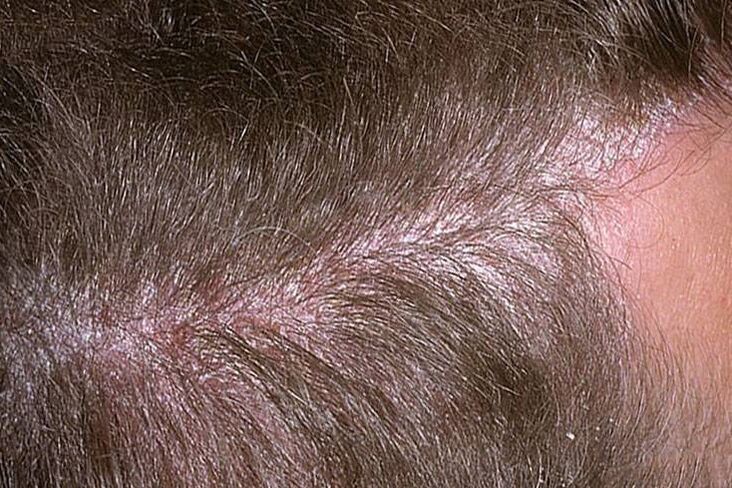
Scalp psoriasis treatment
Once scalp psoriasis is diagnosed, a variety of measures are used to treat it, including:
- integrative therapy;
- topical treatment;
- physical therapy procedures;
- Spa treatment.
In mild and non-progressive cases of scalp psoriasis, in most cases a simple topical prescription is enough to treat it - shampoo, gel, ointment, ringworm, etc. v. At the same time, the treatment of a persistently progressive inflammatory process may require the use of a variety of pharmacological drugs of different classes and physiotherapeutic techniques.
How to treat psoriasis with drugs?
In the complex of general therapy, the doctor may include the following drugs:
- Complex vitamins and vitamins C, A and group B;
- Non-specific immunotherapy drugs: ATP, Aloe;
- Aromatic retinoids;
- Cytostatic drugs;
- Hemodez Solution;
- Absorbents;
- Monoclonal antibodies;
- Immunosuppressive drugs;
- Antihistamines;
- NVPS;
- Sedative;
- Autologous blood calcification.
The use of corticosteroids and cytostatics is recommended during the treatment of severe psoriasis and severe scalp symptoms. They must be used very carefully: such funds can aggravate the course of the disease.
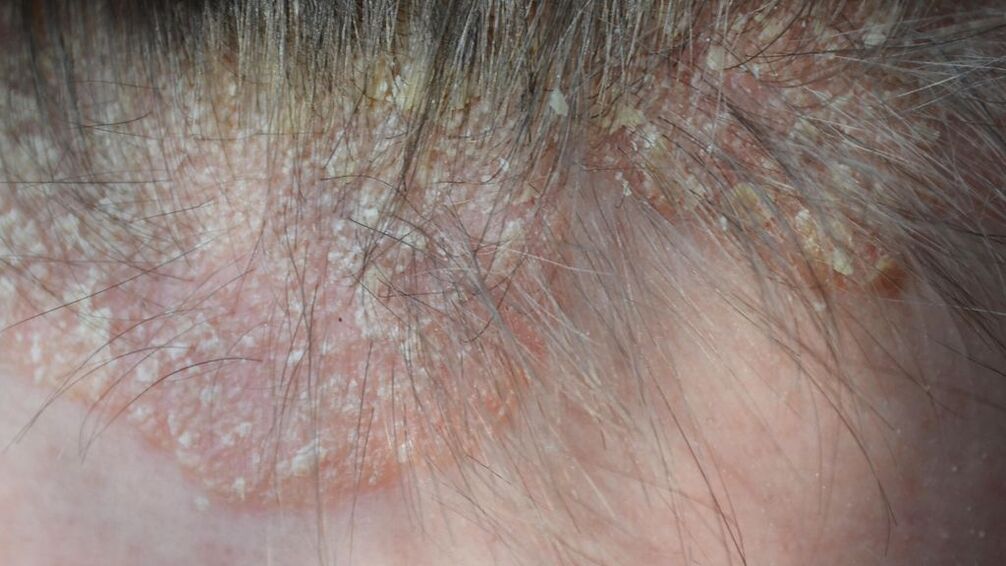
Shampoo for scalp psoriasis
Can scalp psoriasis be treated with shampoo? As a rule, it is not enough to use even a very effective shampoo. However, the use of special healing agents in complex therapy is a prerequisite for the success of the treatment.
All medicated shampoos help reduce inflammation, relieve itching, or relieve itching, but using only one shampoo is not effective - the treatment must be comprehensive.
Ointment
Topical treatment always increases the effectiveness of the drug. In the advanced stages of psoriasis, 2% salicylic and boron-salidol ointments will be useful. If there is an exudative component and severe inflammation, corticosteroid creams and ointments should be indicated.
Non-hormonal ointment containing birch, pine, juniper and coal tar. They can be produced in the form of ointments and pastes.
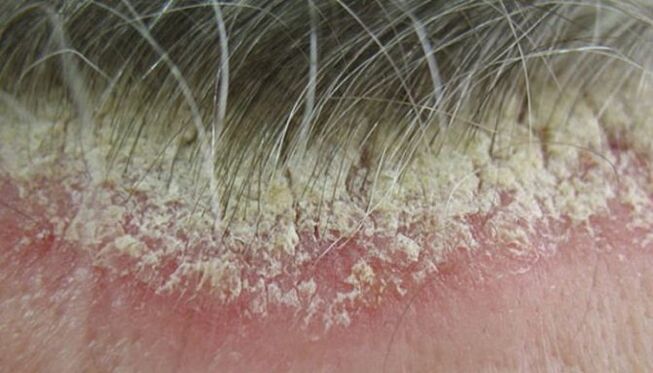
Diet for psoriasis of the head
The diet must be uniform. Food portions should be small, on a "better less, but more often. " The last meal should be no later than 7 p. m. , with a glass of kefir or yogurt in the evening.
- You need to give up alcoholic beverages. Their use during remission can cause exacerbations.
- Fatty, spicy and smoked foods should be excluded from the diet.
- Sweets are also discouraged - cakes, pastries, chocolate, sugar - all of which should be banned for psoriasis. Only a small amount of honey is allowed.
From the drink, tea with sea buckthorn, rose hip or black currant leaves will be very useful.
Spa treatment
During your stay in the hospital, you must perform the following procedures:
- helicopter therapy;
- mud therapy;
- hydrogen sulfide bath and hydrogen sulfide spring bath.
Treatments are carried out in special sanatoriums, they help to reduce the frequency of relapses and achieve long-term remission.
PUVA therapy
PUVA therapy is a physical therapy treatment that involves the use of an active drug and irradiation of the skin with long-wave ultraviolet radiation.
Long experience of use and expert evaluation have proven the effectiveness of PUVA therapy in the treatment of various dermatological diseases (including psoriasis), especially in the case of a persistent course. and ineffectiveness of other treatments. According to statistics, a positive effect is achieved in about 80-85% of cases.
Hair care rules
To achieve a better condition of the hair and scalp, you need to adhere to the basic rules of care, along with recommendations from the doctor:
- Only wash your hair with the specially recommended shampoo.
- Comb your hair with a comb with natural bristles.
- Systematically treat the scalp with antiseptic mixtures.
- Brush your hair gently, gently, without hurting the scalp.
- Try to dry your hair naturally without using a hair dryer.
- With psoriasis on the head, you need to avoid complicated styling, need to use many different styling products.























